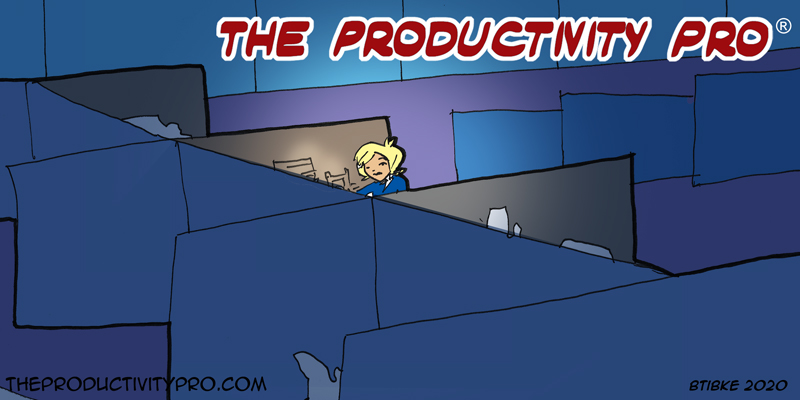
“We need to do a better job of putting ourselves higher on our own ‘to do’ lists.” —Michelle Obama, former First Lady of the United States.
Part of crafting a work/life balance that you can maintain indefinitely is knowing when it’s time to pack it in for the day. You may not have the option of leaving at 5 PM, but then, who does these days? Still, setting a reasonable time to leave work will keep you sane — and profitable.
If you regularly read my blog, you probably know that after about 50 hours a week, the typical worker stops being productive due to both mental and physical fatigue. Those who work 80 hours a week rarely get more done than those who work 40-50 hours a week, according to studies, and too many hours endanger your health, too. There were good reasons why labor and management compromised on the 40-hour work-week a century or so ago. They clearly knew something many of us have forgotten.
Rather than let your inner workaholic take over, try these ways of ensuring you leave on time every day.
- Plan your “exit strategy” in advance. In addition to creating a to-do list, visualize when you want to leave for the day, and why. The “why” is important; don’t just think, “I get to leave” when it’s time to go; think, “That’s when I get to go home to my family and friends,” or “That’s when I get to go to the gym,” or whatever works for you. Set an alarm for your exit time, and structure your day in a way that lets you finish up by then. It can help if you ensure you have a social event to attend, like a club meeting or dinner with your S.O.
- Make it clear to your co-workers that you’re leaving at a specific time. That target may not always prove as firm as you like, but it’s something to shoot for. For one thing, it’ll make sure you budget your time properly so you’re consistently making progress. For another, your co-workers will most likely come to you with any issues earlier in the day — and you can leave most meetings, as necessary, without feeling guilty, whether they’re officially over or not.
- Stick to your priorities. It may make you feel good to strike a low-priority item off your list, and depending upon your mood or when your energy peak strikes, that may be best. However, you’re better served by chipping away at the big projects instead, especially during said energy peaks. You can handle less-important tasks during energy lulls or between larger tasks, let them roll over to the next day, or just let them fall off your list.
- Don’t waste time. Kick procrastination and perfectionism to the curb, rein in all the personal distractions you can, and always have something to do next. The latter ensures you don’t have to waste time deciding what to work on. Plan your day realistically; don’t jam it too full, defeating the purpose. Leave a little “wiggle room” just in case some new high-priority item pops up. If it doesn’t, take something off a standby list to work on until it’s time to head home. And use little time-saving tricks when you can: for example, call instead of email when possible.
- Start preparing to leave 15-20 minutes before quitting time. Establish an end-of-the-day routine, where you tidy up your work materials and workspace, file everything where it goes, get any last-minute information from co-workers, save your files, shut down your browser, clean up your desktops (virtual and physical), etc. Build and check your to-do list for the next work-day, focusing on high-priority and pending items (often pretty much the same). I also recommend you review the day, focusing on what went wrong so you can fix it in the future, and what went right so you can emulate it.
Quittin’ Time
Your daily quitting time shouldn’t be a big deal — just part of a productive day. If you find yourself often pushing past a reasonable quitting time and working until seven or eight at night, then something’s wrong. Some would say you’re incompetent because you can’t properly manage your time, and they’re not necessarily wrong. Part of time management is ensuring you don’t push yourself to worker longer hours to catch up except in times of great need, which should be rare. Most people won’t even notice if you work 70-hour weeks; so, put a significant portion of your time into the life part of the work/life equation. Otherwise, what the heck are you working for besides money?
© 2020 Laura Stack. Laura Stack, MBA, CSP, CPAE is an award-winning keynote speaker, bestselling author, and noted authority on employee and team productivity. She is the president of The Productivity Pro, Inc., a company dedicated to helping leaders increase workplace performance in high-stress environments. Stack has authored eight books, including FASTER TOGETHER: Accelerating Your Team’s Productivity (Berrett-Koehler 2018). She is a past president of the National Speakers Association, and a member of its exclusive Speaker Hall of Fame (with fewer than 175 members worldwide). Stack’s clients include Cisco Systems, Wal-Mart, and Bank of America, and she has been featured on the CBS Early Show and CNN, and in the New York Times. To have Laura Stack speak at an upcoming meeting or event, call 303-471-7401 or contact us online.



Elon Musk advises to get rid of meetings.
“Excessive meetings are the blight of companies and almost always get worse over time. Please get rid of all large meetings, unless you’re certain they are providing value to the whole audience, in which case keep them very short.”